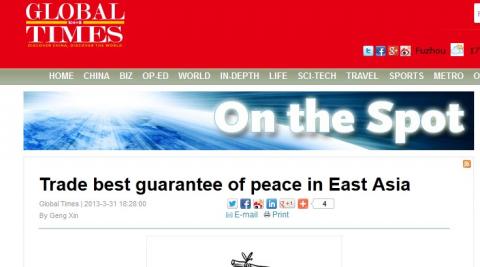
文章截图
我院高级研究员庚欣3月31日在《环球时报》英文版发表题为“经济交往是东亚的和平保证”的文章,呼吁中日韩三国加强贸易往来和经济交流,使之成为解
决东亚领土争端、使东亚和平共处的重要手段。庚欣是知名日本华人学者、JCC新日本研究所副所长、中国人民大学重阳金融研究院高级研究员。
以下是文章原文:
Trade best guarantee of peace in East Asia
Global Times | 2013-3-31
By Geng Xin
There`s an old story in China that tells of how three generals died when competing for two peaches. Some people use this story to describe
the disputes between China, Japan and South Korea over two islands. In reality, these three countries are not as stupid as the three
generals.
In spite of existing disputes over the islands, East Asia leads the development of the global economy. Such rapid economic development and
increasingly close multilateral dependencies can maintain overall stability in this region. Positive cooperative factors are much greater
than negative disputes and there is still room for cooperation to grow.
The first round of negotiations for the China, Japan and South Korea Free Trade Agreement (FTA) launched by the three countries successfully
ended in Seoul Thursday. At the East Asia Summit in November last year, given the tense environments caused by the island disputes, leaders
from these three countries still announced that trilateral FTA negotiations would be launched in March.
Although no trade or economic negotiations can be completed overnight and many difficulties remain for the negotiations to overcome, such an
attitude is a promising beginning. It can demonstrate the three countries` close economic and trade relations, an urgent desire to enhance
cooperation, the courage to withstand pressures and the political wisdom to focus on the overall situation.
The combined GDP of China, Japan and South Korea has reached $15 trillion, accounting for 20 percent of the world`s total and 90 percent of
East Asia`s, but the trade volume among the three accounts for less than 20 percent of their total foreign trade volume. Their economic
relations are complementary. Establishing this trilateral FTA will reduce the influence of many trade barriers and build a huge market of 1.5
billion people.
There are many ongoing economic and trade negotiations in the Asia-Pacific region: the Trans-Pacific Partnership Agreement (TPP) led by the
US, the ASEAN+6 FTA, and the China, Japan and South Korea FTA. Some people pay more attention to differences and conflicts while ignoring
that these very conflicts can better demonstrate the development of East Asian cooperation. Economic and trade clashes show that this region
is a meeting point of global interests. They also reflect that a cooperation mechanism that can adapt to the pace of development is needed.
Some people always hold that in the FTA negotiations between China, Japan and South Korea, it should remain true that "business is business."
There are also some who would use political reasons to block economic cooperation. These are shallow perspectives.
To countries like China, Japan and South Korea, economic relations themselves are of political significance. In fact, without economic
interactions and mutually beneficial mechanisms, friendship cannot last for long.
China, Japan and South Korea also have a common position in political, security and military fields. We all pursue peace and avoid war. Even
Shintaro Ishihara, an outspoken hawk in Japan, has clearly stated that he has not sought a war with China.
Geographically, China, Japan and South Korea share the same region. An old Chinese saying holds that a far-off relative is less help than a
neighbor close by. The US which is distant would have difficulty matching up with a regional neighbor. The relationship among the three
countries should have become closer and the current situation in East Asia should not have come to pass after the end of the Cold War. Of
course, the US may feel uncomfortable about this. However, the US cannot enjoy the advantages brought about by global peaceful development
after the Cold War and insist on an outdated Cold War pattern at the same time. It is unfair and unsustainable.
China, Japan, South Korea and even the US should have common interests in achieving peaceful development by cooperation. This will be the
best guarantee for all.
The author is a senior research fellow at Chongyang Institute for Financial Studies, Renmin University of China and deputy director of the
JCC New Japan Research Institute.